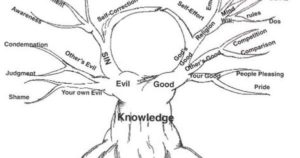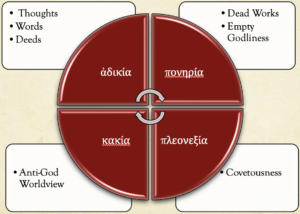
Schematic of Man’s Conception of
Good and Evil from the same tree
I read an article on Facebook in which a college-age woman confronted an open-air preacher asking why does not God just forgive everyone? To answer her question means we must understand the underlying assumptions hidden in her question. It is these types of questions many Christians cannot answer because they do not look at assumptions and implied consequences.
Why does God not forgive everyone? We understand no one seeks salvation from God (Ro 3:10-12). Therefore, salvation is given by God based solely on His grace (Ro 9:14-24); ergo, everyone saved since Creation owes salvation totally to God. To the lost mind this places the onus directly on God rather than the one who sinned against God. Yet, this forces a false dilemma; God is unjust and therefore as sinful as people making any judgment on His part unjust. This perspective is always told from the viewpoint of the sinner and as Paul taught, the sinner’s main conclusion is God is always unjust (Ro 1:28-29a). This is rarely taught even in true Christian churches as many are steeped in free will philosophy rather than biblical truth.
Remember, sinful man put all knowledge to the test based on sinful criteria which filtered out all knowledge of God. In its place man substituted elements of God’s creation rather than God Himself as the Primary Cause. Sinful man then developed a four-fold methodology for testing all knowledge insuring its anti-God bias.

Four-fold Test of Knowledge
Filter out ALL truth of God
Unrighteousness, ἀδικία, covers the thoughts, words and deeds arising from a sin nature. Wicked, πονηρία, is one’s system of dead works that passes for godliness though it denies true godliness. Covetousness, πλεονεξία, is the unrelenting drive to possess whatever one does not have by robbing those who have the possession. Finally, malice, κακία, is the goal of all sinners: condemnation of God. By the application of these criteria all sinners test or proof knowledge insuring it is devoid of God’s truth. However, this does not mean that man is unaware of his, her, deceit; one’s conscience cries out in guilt warning the person of sin. From this foundation the woman mentioned in the beginning could only arrive at one conclusion, God is unrighteous if He does not forgive everyone automatically.

This goal describes how sinners
Justify themselves by Majority
No one needs to be convinced they are sinners, that is the function of guilt. People cannot accept the fact of their sinfulness therefore sinners seek to find others more sinful than themselves, condemn those people and hope God’s penalty misses them since they helped God by finding those terrible sinners. This is the impetus for the Social Justice Movement. However, they miss the fact that any sin condemns them as worthy of justice. One can never do enough good to cover up even one infraction, no matter how seemingly insignificant. Their form of godliness, finding others more sinful than themselves, their view point, will not mitigate their guilt one iota; and this they know. But, what if God did not punish sin? What would be the unintended consequences?
If God excused sin, for that is really what is meant by their use of the term forgiveness, then there would be no standard or measure of behavior. the sinner immediately cries out, “Freedom!” However, being free from sin’s consequences does not bring any freedom; indeed, it breeds slavery to sin (Ro 6:15-18). Sin develops rebellion against God and His goodness or morality which defined the limits of behavior as expressed in the Ten Words (Ex 20:1-17). Thus, if one is free from sin’s consequences; i.e., God’s punishment, then one is eternally enslaved to sin. As Paul wrote, sin always results in degradation. The visible forms of sexual degradation reflect the spiritual and therefore hidden aspects of moral degradation which precedes physical degradation (Ro 1:22-27). To whom can you turn for help when this degradation becomes apparent? Satan? He is the father of all sinners (Jo 8:44). Indeed, he is also a slave to his own sin and worse; he has no hope of salvation-ever! Rather than realize his slavery to sin, he embraces it as it consumes him in its futility. He will not escape God’s justice (Re 20:11-15). For to escape justice is to embrace nihilism, the very fruit of sin (Ecc 1:1-11). For all who are born in the flesh must face separation from the flesh, death, and then the judgment (He 9:27).

Passing Judgment, condemnation,
Does not hide but confirms your sin
God has already judged sin in the flesh in the form of Christ, the sinless for the sinful. And just as God would not allow Christ to see corruption, neither will He visit nihilism on those who call on the name of the Lord for salvation (Ps 16:9-11). At salvation, the condemnation for sin covers you so that God sees Christ’s righteousness rather than your sinfulness. We are made new creations in Christ (2Co 5:17). Our dead system of works are expunged which otherwise would have stood before God testifying against us insuring our eternal condemnation (Re 20:12). This is the ultimate form of nihilism; an eternal search for any spark of God’s righteousness which could free you from the Lake of Fire. However, unbelievers want nothing to do with God and this fulfills their wish. God will not be with them nor will He hear nor answer their pleas (Lk 16:22-26). What is the division between sinners and ex-sinners?

Repentance acknowledges Guilt
Evidenced by Submission to God
The fool has said there is no God (Ps 14:1). That is true of all who sinned. But, God will save some to demonstrate His salvation that could have belonged to everyone (Ro 9:20-24). This is not a haughty demonstration of His superiority but a demonstration of His mercy on those who deserve no mercy and at the expense of His son who became sin for us so that some may be saved. We do not submit to be saved, we submit because at the moment of salvation we realize the great grace of God and are humbled by His mercy.
God is giving the world a small taste of the nihilistic depravity of unbridled sin. The increase in degradation and violence are embraced by people everywhere while they continue to condemn God. God is not the author of sin nor did He cause man to sin (Ja 1:13-15). However, the Bible shows God at every turn offering people compassion, not in the form of empty works but in the completed sacrifice of Christ. Sinners, in their pride, continually reject God and thus believe themselves to be the judges of both people and God. Seeking to show themselves righteous, they prove themselves worthy of condemnation. I was worthy of condemnation! Yet, Christ saved me and He can save you also.
The justice of God proves His existence as does the fact that every person has His moral code written into their soul; Ten Words. Rejection of His justice means that one rejects all hope leaving only nihilism as one’s eternal destiny. If justice is suspended then no one will look for the coming judgment and remain trapped in their sin. Justice is the mercy of God warning of the coming accountability while offering the way of escape through Christ Jesus (1Co 10:13).
